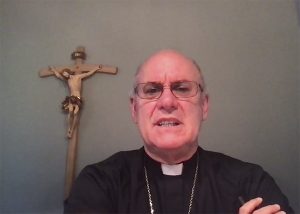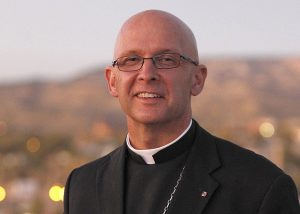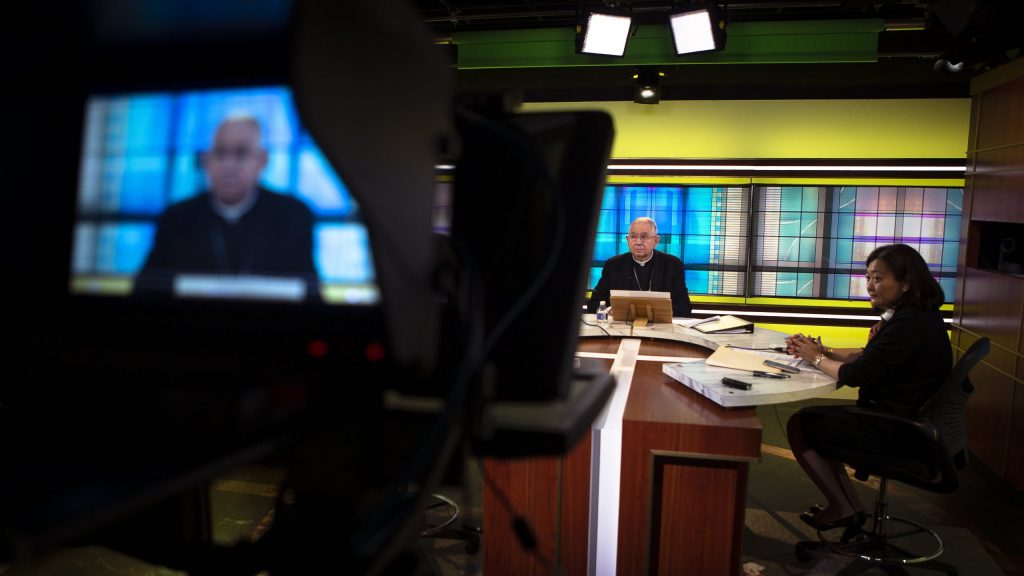A proposed document to examine the "meaning of the Eucharist in the life of the church" received a thorough discussion June 17 during the second day of U.S. bishops' spring general assembly.
For more than two hours during the bishops virtual assembly, 43 bishops expressed differing views about the proposed document. Some stressed it was necessary to provide clarity about the significance of the Eucharist, while others questioned its timing and if it could be perceived as fracturing the unity of a church already faced with numerous challenges.
The bishops reached no consensus during the discussion. They voted electronically whether to move the proposal forward immediately after the meeting concluded late in the afternoon. The tally was scheduled to be announced when the bishops reconvened June 18.
Most bishops welcomed the idea of strengthening teaching about the Eucharist, especially since the bishops have embarked on a multiyear National Eucharistic Revival initiative that is part of the U. S. Conference of Catholic Bishops' 2021-2024 strategic plan.
Bishop Kevin C. Rhoades of Fort Wayne-South Bend, Indiana, chairman of the bishops' doctrine committee, presented an outline of the document to the bishops in a prerecorded message. He said the proposed draft was developed in light of the decline in the belief among Catholics in the Real Presence in the Eucharist as well as the long absences from regular Mass attendance, which may have led to people to place less significance on the Eucharist in their lives.
The proposed document was the focus of the first moments of the bishops' assembly, which started with a discussion about how they would proceed with this agenda item.
The Communion document also was a key point of discussion in the news conferences June 16 and 17. On June 17, Bishop Rhoades stressed that creating national norms was never the intent behind a proposal to write a new statement on the Eucharist.
He said the document was meant to provide guidance for bishops and that the committee's caution on developing any national policy or norms came out of the Congregation for the Doctrine of the Faith during the U.S. bishops' recent "ad limina" visits to Rome.
"We have taught in years past about Catholics in political life, the importance of adherence to church teaching in the document on worthiness to receive holy Communion, back in 2006," Bishop Rhoades said. "But with this new strategic plan that's going to be focused on the Eucharist, this three-year plan, we have to teach this again, on different levels."

He was referring to a multiyear National Eucharistic Revival initiative which has been in the planning stages for over a year; the bishops were scheduled to hear an update on these efforts June 18.
In response to questions asked during the June 17 news conference, Bishop Rhoades stressed that the draft document on the Eucharist will be a pastoral statement that will not be rushed for political reasons. He also said the way it will be worded will stress that this is a message for all Catholics not just specific politicians.
Archbishop Christophe Pierre, papal nuncio and Los Angeles Archbishop José H. Gomez, president of the U.S. Conference of Catholic Bishops, gave opening presentations to the bishops June 16 that stressed the need for unity as the church emerges from the pandemic year.
The nuncio said dialogue is a key step on the path to unity.
"That is important for us during this 'Amoris Laetitia' Year of the Family -- to encounter families, even broken ones, and to accompany them on their journey through thoughtful dialogue," he said in a prerecorded address.
Some of Archbishop Pierre's remarks seemed to predict the difficulty the bishops could face June 17 in debating approval of the drafting of the Communion document.
"At the heart of dialogue is the communication of one's own personal life to others," he said, adding the goal of such dialogue "should be unity and not merely doctrinal and juridical unity."
In speaking about the church emerging from the pandemic, he said it should be a church that "goes forth with compassion and mercy, in solidarity with those who suffer in order to bring them true healing."
Archbishop Gomez similarly spoke of the challenge before the church after this past year.
All the events of the past year or so, he said, will shape the vision of the church "for years to come." That's why unity is important, he added.
He also noted that unity doesn't mean bishops will never disagree, noting that even the apostles disagreed, "but never about the truth of the Gospel."
The church has to defend the truth about God, the sanctity of the human person and the unity of the human family, he said, adding: "This is our mission, the urgent task of the whole church in this moment -- after this pandemic, in the face of the chaos and confusion in our society."
The bishops heard a preliminary presentation on three sets of translations from the International Committee on English in the Liturgy, or ICEL, on: the Blessed Virgin Mary, Mother of the Church; additional intercessions and psalter concluding prayers for the Liturgy of the Hours; and the Order of Penance.
Debate and a vote on each set took place June 17 -- each requires two-thirds approval of the Latin-rite bishops. Following such approval, the Vatican Congregation for Divine Worship and the Discipline of the Sacraments needs to issue a "confirmatio" before the translations can be used.
A presentation on the proposed "Pastoral Framework for Marriage and Family Life Ministry in the United States: Called to the Joy of Love" was given by Archbishop Salvatore J. Cordileone of San Francisco on June 16.
The chairman of the bishops' Committee on Laity, Marriage, Family Life and Youth, which drafted the document, said the document's framework addresses many challenging areas by providing guidelines for pastoral care. A debate and vote on the document took place June 17.
The framework incorporates a comprehensive overview of marriage ministry and outlines activities that pastoral ministers can initiate for Catholics living in a variety of family situations, Archbishop Cordileone said.
On June 17 the bishops were asked to consider authorizing development of a new formal statement and comprehensive vision for Native American and Alaska Native ministry, since the last one approved was over 40 years ago.

"A pastoral plan will help reassure Catholic Natives that their ministry has a high priority in the church," he said. "The last time the general assembly passed a major pastoral plan for Native Americans was 1977, said Bishop James S. Wall of Gallup, New Mexico, chairman of the USCCB's Subcommittee on Native American Affairs.
In a June 16 report, Scott Voynich, chairman of the National Advisory Council said the group of lay, clergy and religious members were particularly in favor of the bishops' multiyear National Eucharistic Revival initiative.
He said the council was concerned about a lack of clarity on the Eucharist among Catholics and felt the bishops should explain this better but that its members also were concerned the plan could be seen as a burden, not an inspiration, for priests.
In a report to the bishops on the second day of meetings, Suzanne Healy, chairwoman of the National Review Board, noted that although major steps have been taken to help achieve healing and reconciliation with survivors of clergy sexual abuse, much work remains ahead for the U.S. Catholic Church.
She said transparency remains a key concern of the review board and thanked bishops and eparchs who have released lists of clergy with substantiated abuse allegations including those who are deceased and removed from ministry.
The bishops also gave their go-ahead on June 17 to two dioceses to continue their efforts to make their case for a priest and a brother to be considered for sainthood.
The men are Father Joseph Verbis Lafleur of the Diocese of Lafayette, Louisiana, an Army chaplain who died in World War II, and Leonard LaRue, a naval captain who later became a Benedictine monk named Brother Marinus. They are revered for their heroism in World War II and the Korean War, respectively.
Contributing to this report was Rhina Guidos, Mark Pattison, Dennis Sadowski and Carol Zimmermann.

